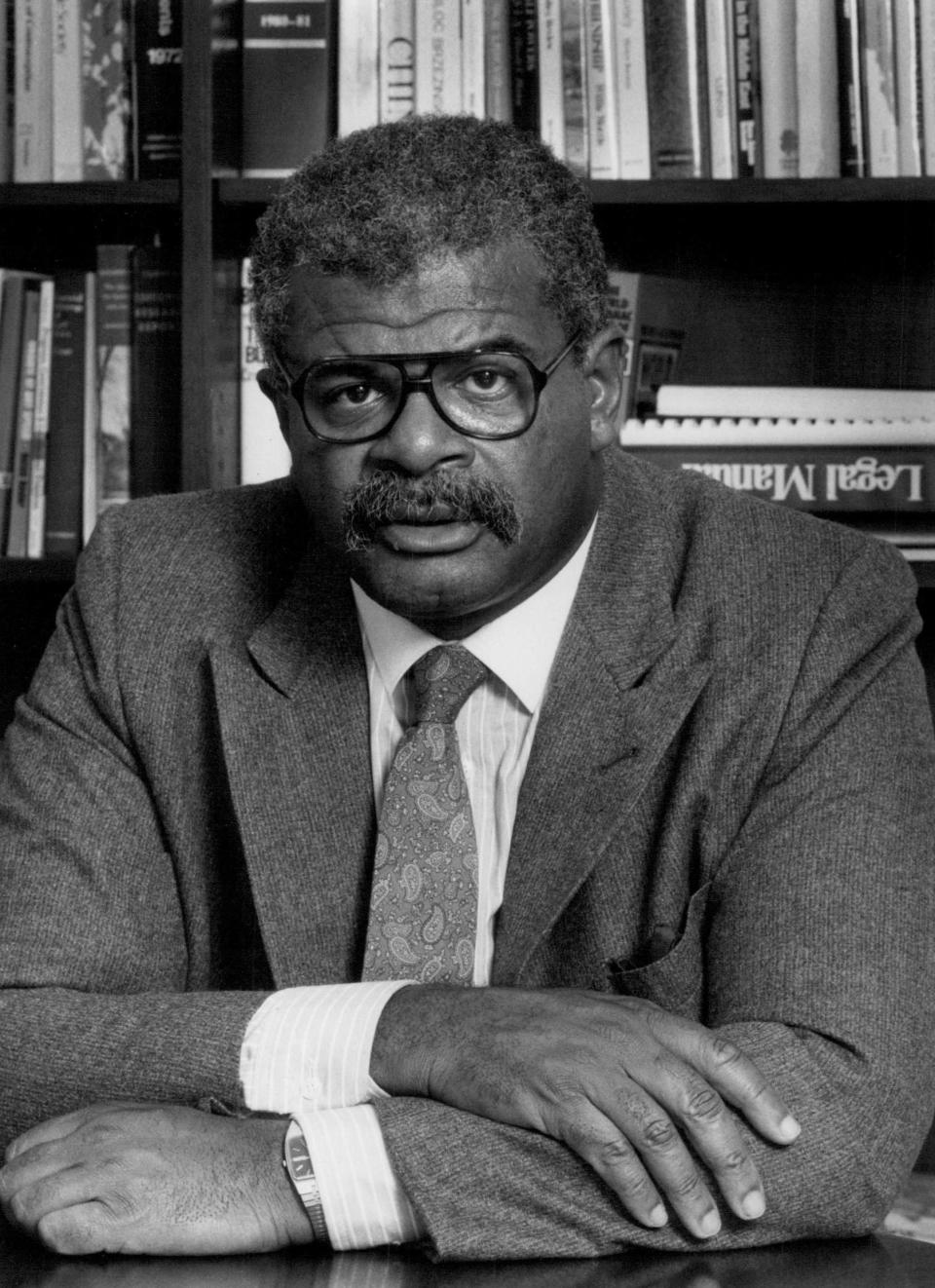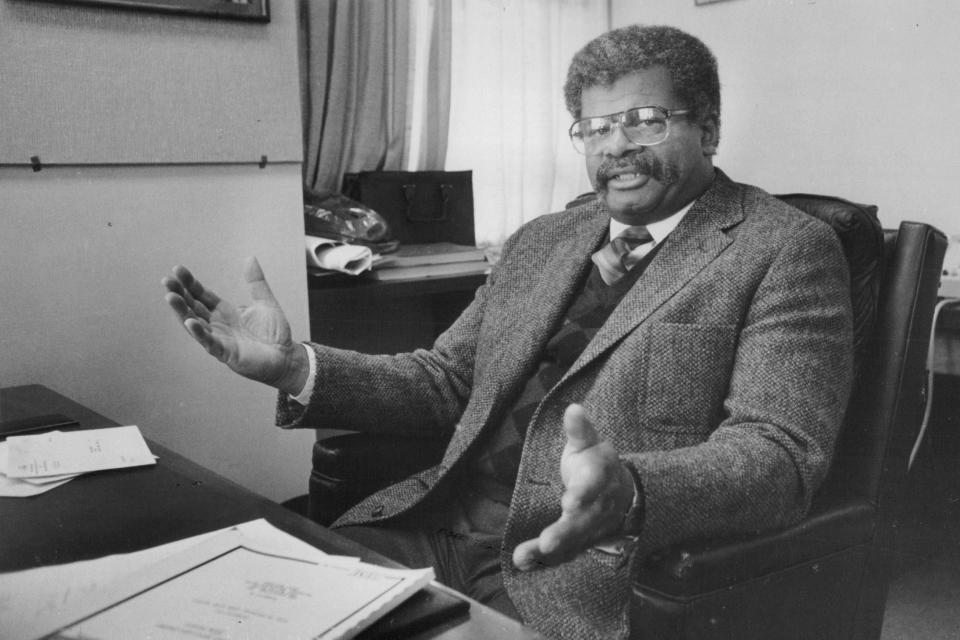Gus Newport, Rochester-born socialist icon and influential progressive, dies at 88
- Oops!Something went wrong.Please try again later.
Gus Newport, the influential national progressive who first honed his political and organizing skills in his native Rochester, died June 17 at age 88.
Newport was best known as the avowedly socialist two-term mayor of Berkeley, California, and as a crusader for peace and economic justice in American policy at home and abroad.
He was a close ally to a constellation of radical progressive leaders, notably Bernie Sanders, Angela Davis and Adam Clayton Powell Jr. His relationship with the most prominent of them, Malcolm X, was forged during his time in Rochester.
"There is no way you can justify the degree of poverty in this country," he said in a 1983 interview with the Times-Union. "Some people sleep on the streets and others are wealthy. ... So I don't mind being known as an advocate for peace."
How Gus Newport impacted Rochester, NY politics
Eugene Newport was born in Rochester April 5, 1935, and grew up on Waverly Place in the Third Ward, the oldest of five children in a politically active family. He graduated from Madison High School in 1953, attended college at Heidelberg College in Ohio and spent two years in the U.S. Army in Germany before returning home in 1961 to work as a computer programmer.
Newport's active period in Rochester politics was short-lived but tumultuous. He joined the Monroe County Non-Partisan League, a civil rights group, and soon met the moment that began his engagement with activism: the 1962 beating of Rufus Fairwell, a gas station attendant, by Rochester police.

In a 2009 interview with historian Laura Warren Hill, Newport said was among those who visited Fairwell in the hospital and then organized protests and advocacy actions regarding that and subsequent incidents of police misconduct.
"The police condition that existed in Rochester at that time and across America are an extension of slavery," he said. "All one has to do is look at the inner cities today, ... (especially in) a city as well off as Rochester was."
He was also prominent in protests in 1963 after police raided a Nation of Islam meeting in Rochester. It was during that period that he became one of Malcolm X's closest associates here, escorting him around town and speaking on strategic goals.
“He came back and forth from Rochester,” Newport said earlier this year in a conversation with Danny Glover, another longtime friend. "And often used to tell me: 'Brother Eugene, don’t shout too hard, you know when your voice reaches out, it scares people to death.'"
Already at that early point in his career, Newport demonstrated a talent for bridging local and national issues. He loudly rejected requests from the NAACP and more moderate Black leaders not to involve Malcolm X in organizing.
"Ranting against the activities of these dissenting nationalistic groups (is) pointless," he said in 1963. "The situation demands, without further delay, that this community recognize that our Negro citizens are entitled to all the rights and privileges of American citizenship."
Newport left Rochester in 1963 for a job downstate. Local leaders summoned him back to town after the uprising the following year, hoping he could help calm tensions and serve as a bridge for negotiations. In 1965 he protested the arrival of Saul Alinsky, a white radical organizer from Chicago, insisting leadership should instead come from within the local Black community.

He briefly lived in Rochester again in 1968, waging an unsuccessful battle over the direction of the startup non-profit Action for a Better Community. Shortly thereafter he moved to New York City, and then in 1974 to Berkeley, a city more receptive to his progressive beliefs.
"Rochester's extremely conservative," he told the Times-Union in 1983. "It's a sad feeling. Rochester is my home, and it has the resources to be a great city, but it never has been."
How Gus Newport became 'Galloping Gus'
In Rochester, Rev. Franklin Florence, another civil rights leader, had termed Newport the "Roaring Lion." As mayor of Berkeley, a job he held from 1979 to 1986, he was "Galloping Gus," a nod to his penchant for making connections beyond city limits.
He traveled multiple times to El Salvador and Cuba, worked on divestment from South Africa, established the Middle East Children's Alliance and spoke at conferences in Spain, Sweden, Finland and Austria. Jesse Jackson referred to him as "the mayor of the world," and Bernie Sanders, mayor of Burlington, Vermont, took him as a role model.
“You cannot separate our domestic problems from our foreign policies,” he said alongside Sanders in a 1985 interview. “In fact, from one set of policies, we have two victims: the people of the third world in general — Central America and Africa — but also the working-class people of this country.”
Newport stepped down in 1986 after serving two terms as mayor. He later led a Boston-area community service agency, the Dudley Street Neighborhood Initiative, and strengthened his international ties through service with the United Nations, UNICEF and the World Peace Council, among others.
After Hurricane Katrina devastated New Orleans in 2006, Newport was active on an advisory board related to the rebuilding of the city. He lived most recently in the Oakland, California area.
“Gus was an inspiration, standing alongside civil rights giants like Malcolm X in the fight for the human rights of all African Americans,” U.S. Rep. Barbara Lee, a California progressive, wrote in a statement. “He has spent his life fighting for justice and liberation, and the world is a better place because of him."
This article originally appeared on Rochester Democrat and Chronicle: Gus Newport, Rochester-born socialist icon, dies at 88

